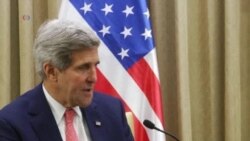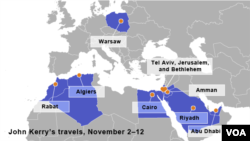AMMAN —
U.S. Secretary of State John Kerry said he has had "productive" discussions with both Israeli Prime Minister Benjamin Netanyahu and Palestinian President Mahmoud Abbas about a two-state solution to their decades-long crisis.
Kerry has met twice separately with Prime Minister Netanyahu and President Abbas over the past two days, and said that "despite difficulties" those talks have "opened up a number of different things that can be included as we proceed forward." But he will not say what those things are.
"By agreement, all the parties are not going to discuss what we are discussing. And since I'm the one who invoked that rule, I'm not going to stand up here and break it," Kerry said. "But it is important for us to be able to proceed carefully, quietly, and secretly, frankly."
He said not speaking publicly gives leaders the ability to explore different possibilities.
But leaders are speaking publicly. And it is not encouraging.
Prime Minister Netanyahu is blaming Palestinians for incitement, for creating artificial crises, and for running away from tough choices. Palestinian negotiators say Israelis are making unreasonable demands over water rights and are undermining the talks with plans for thousands of new Israeli homes on occupied Palestinian land.
The scale of those new settlements has put President Abbas under considerable domestic pressure, including allegations that he agreed to that construction as part of returning to talks. On Wednesday, Kerry defended the Palestinian leader, saying the United States believes those settlements are illegitimate.
Following talks with Kerry in Amman Thursday, Jordanian Foreign Minister Naser Judeh said Israeli settlements are impeding peace, and negotiations must be accelerated to get to a final status agreement on a two-state solution, including the states' borders. "Partial solutions, in my book, that leave issues hanging which could potentially come back and fly at our throats in the future, are not solutions," he said.
With six months to go in these talks, Kerry said there is no time for interim agreements.
"If you leave the main issues hanging out there, mischief makers will make the most of that and bad things will happen in the interval that then make it even harder to get to the final status," stated Kerry.
He said peace between Israelis and Palestinians is long overdue.
"The stakes here are huge. And obviously the lack of peace confronts everybody with choices, frankly, that nobody wants to contemplate," said Kerry.
Kerry meets again with Prime Minister Netanyahu in Israel Friday following a Thursday dinner in Jordan with President Abbas.
Kerry has met twice separately with Prime Minister Netanyahu and President Abbas over the past two days, and said that "despite difficulties" those talks have "opened up a number of different things that can be included as we proceed forward." But he will not say what those things are.
"By agreement, all the parties are not going to discuss what we are discussing. And since I'm the one who invoked that rule, I'm not going to stand up here and break it," Kerry said. "But it is important for us to be able to proceed carefully, quietly, and secretly, frankly."
He said not speaking publicly gives leaders the ability to explore different possibilities.
But leaders are speaking publicly. And it is not encouraging.
Prime Minister Netanyahu is blaming Palestinians for incitement, for creating artificial crises, and for running away from tough choices. Palestinian negotiators say Israelis are making unreasonable demands over water rights and are undermining the talks with plans for thousands of new Israeli homes on occupied Palestinian land.
The scale of those new settlements has put President Abbas under considerable domestic pressure, including allegations that he agreed to that construction as part of returning to talks. On Wednesday, Kerry defended the Palestinian leader, saying the United States believes those settlements are illegitimate.
Following talks with Kerry in Amman Thursday, Jordanian Foreign Minister Naser Judeh said Israeli settlements are impeding peace, and negotiations must be accelerated to get to a final status agreement on a two-state solution, including the states' borders. "Partial solutions, in my book, that leave issues hanging which could potentially come back and fly at our throats in the future, are not solutions," he said.
With six months to go in these talks, Kerry said there is no time for interim agreements.
"If you leave the main issues hanging out there, mischief makers will make the most of that and bad things will happen in the interval that then make it even harder to get to the final status," stated Kerry.
He said peace between Israelis and Palestinians is long overdue.
"The stakes here are huge. And obviously the lack of peace confronts everybody with choices, frankly, that nobody wants to contemplate," said Kerry.
Kerry meets again with Prime Minister Netanyahu in Israel Friday following a Thursday dinner in Jordan with President Abbas.






